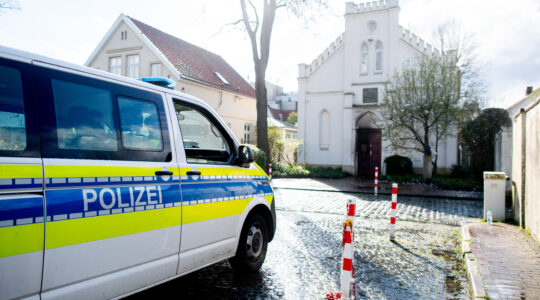BERLIN (JTA) — Germany is considering whether to charge eight Germans who worked at the Stutthof concentration camp as accessories to murder.
It is the first time since the 2011 verdict against concentration camp guard John Demjanjuk that German prosecutors are considering the option of putting people on trial who worked in a concentration camp rather than limiting it to a death camp, Nazi hunter Efraim Zuroff, head of the Simon Wiesenthal Center’s Jerusalem office, told JTA.
Applauding the investigators and urging prosecution, World Jewish Congress President Ronald Lauder said in a statement: “It is critical that all those who took part in the genocide of Jews and crimes against humanity are put on trial, irrespective of their age.”
Investigators from the Central Office for the Investigation of Nazi Crimes in Ludwigsburg announced Tuesday that they had identified four men who worked as guards and four women who were office workers at Stutthof, where more than 60,000 people died by the time the Nazis evacuated the camp in January 1945. According to the U.S. Holocaust Memorial Museum, Germany established Stutthof near Danzig, Poland, as a labor camp in 1939. It became a concentration camp in 1942, mainly for non-Jewish Poles.
Zuroff said the Wiesenthal Center was “pleased that German authorities are hoping to expand the number of potential suspects by including people who served in concentration camps that were not death camps.” Until now, he said, the authorities had claimed the change in prosecution policy applied only to death camps.
The suspects were all born between 1918 and 1927 and now live in Germany. According to Jens Rommel, head of the investigatory authority, the materials gathered on the suspects has been sent to prosecutors in their states.
Rommel told German news media that he was not sure if it would be possible to apply the law to those found to have worked outside the circle of death camps. But he also said the camp actually became a death camp in 1944. The U.S. Holocaust Memorial Museum notes that a small gas chamber was installed there and used in 1944 for the extermination of prisoners who were unable to work.
If tried and found guilty as adults at the time of their crimes, the suspects could face prison terms of between three and 15 years, according to news reports.
The office in Ludwigsburg made a major push to identify former death camp guards after the conviction of Demjanjuk for his role as an accessory to the murders of nearly 30,000 Jews in the Sobibor death camp in Poland. The case set a precedent that being a guard at a death camp was sufficient to prove complicity in murder.
The current case indicates that there may still be more Nazi perpetrators to be found more than 70 years after the end of World War II.
Zuroff told JTA he is still waiting for news about several former members of the Einsatzgruppen death squads who may still be living in Germany.





